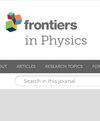考虑晶体热效应的光学参量振荡器的数值分析与验证
IF 1.9
3区 物理与天体物理
Q2 PHYSICS, MULTIDISCIPLINARY
引用次数: 0
摘要
本文提出了一种考虑晶体热效应的光学参量振荡(OPO)过程计算模型。在现有模型的基础上,我们将一组三波耦合方程与 Sellmeier 方程相结合。为了优化非线性过程的计算,我们引入了温度变量 t 来描述激光晶体在工作过程中产生的热量。分析了不同泵浦功率下的波形。研究了输出镜反射率对 OPO 门限和反向转换的影响。此外,还可以估算出不同泵浦功率下的最佳反射率。根据模拟结果,还在近红外 1.57 µm 波段和中红外 3.15 µm 波段进行了实验。实验结果与该模型和不考虑晶体热效应的模型的结果进行了比较。实验结果与改进后的理论结果一致,证明所提出的理论模型可以模拟 OPO 的能量转换过程。这为优化 OPO 输出镜的参数和提高参量波转换效率提供了理论依据。本文章由计算机程序翻译,如有差异,请以英文原文为准。
Numerical analysis and validation of an optical parametric oscillator considering crystal thermal effects
In this paper, a calculation model is proposed for the optical parametric oscillation (OPO) process considering the crystal thermal effects. Based on existing models, we combine a set of three-wave coupled equations with the Sellmeier equation. In order to optimize the calculation of the nonlinear process, a temperature variable t is introduced to describe the heat generated by the laser crystal during operation. The waveforms under different pump powers are analyzed. The effects of the reflectivity of the output mirror on the OPO threshold and inverse conversion are investigated. In addition, the optimal reflectivity under different pump powers can be estimated. Based on the simulation results, experiments are also performed in the near-infrared 1.57 µm band and mid-infrared 3.15 µm band. The experimental results are compared with the results of this model and a model that does not consider crystal thermal effects. The experimental results are consistent with the improved theoretical results, affirming that the proposed theoretical model can simulate the energy conversion process of OPO. This provides a theoretical basis for optimizing the parameters of the OPO output mirror and improving the efficiency of the parametric wave conversion.
求助全文
通过发布文献求助,成功后即可免费获取论文全文。
去求助
来源期刊

Frontiers in Physics
Mathematics-Mathematical Physics
CiteScore
4.50
自引率
6.50%
发文量
1215
审稿时长
12 weeks
期刊介绍:
Frontiers in Physics publishes rigorously peer-reviewed research across the entire field, from experimental, to computational and theoretical physics. This multidisciplinary open-access journal is at the forefront of disseminating and communicating scientific knowledge and impactful discoveries to researchers, academics, engineers and the public worldwide.
 求助内容:
求助内容: 应助结果提醒方式:
应助结果提醒方式:


